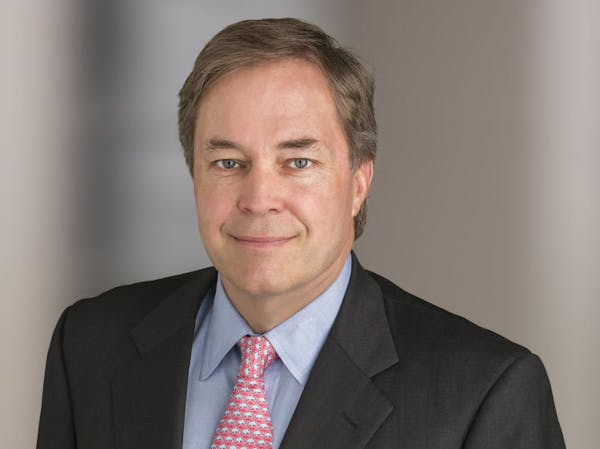David MacLennan, the new CEO of Cargill come December, has an accomplished record within the company that's typical of its senior executives.
"MacLennan joined Cargill in 1991 and has held various leadership positions within the financial, risk management, energy and animal protein businesses in the United States, London and Geneva," reads Wednesday's announcement of his appointment.
What the statement doesn't get around to actually saying is that MacLennan did not have an uninterrupted 22-year climb to the CEO's office in Minnetonka.
In September 2000 MacLennan went to downtown Minneapolis to join U.S. Bancorp Piper Jaffray as managing director and head of its fixed-income unit.
He was back at Cargill by 2002, but that still means that MacLennan is the first CEO of this storied private company who isn't really a Cargill lifer.
What his round trip shows is that Cargill isn't the Cargill of 30 years ago. Its leadership correctly values talent enough to make room for an executive who once walked out.
Taking back a former employee is not exactly unheard of by an American business, but Cargill historically isn't like most other businesses, and not just because it employs 140,000 people in 65 countries.
The Church is known for occasionally welcoming back an apostate. Cargill isn't.
Cargill is run by Cargill people, and to most outsiders taking a job at Cargill looks like signing up for a career in the military.
A young officer may go from a glamorous junior staff job in the Pentagon to his next post as executive officer of a remote refueling depot in the Aleutians before going on to the Middle East. What that demonstrates to the big brass is an ability to handle new challenges. And, of course, it shows a particular kind of deep loyalty to an organization.
That's the Cargill way, too.
Ernest Micek, elected CEO in 1995, was a 1959 graduate of the University of Wisconsin in chemical engineering who went to work for Cargill that year. He had held a variety of jobs in the United States and in Spain and was credited for leading the company's business in corn milling.
Warren Staley went to work as a trainee at Cargill in 1969 and held management posts in the United States, Europe and South America. Thirty years after he started, he became CEO.
His successor is in the job now, Greg Page. Page joined the company as a trainee in the feed division in 1974, and in 1985 went to Singapore to direct Cargill's animal nutrition operations in Asia. In 1992 he came back to the United States and later took over as sector president overseeing the company's financial markets and beef and pork groups. He eventually became CEO in 2007.
That's sort of the way MacLennan's career was headed, too. Except for that Piper Jaffray part.
Piper was still part of U.S. Bancorp in 2000 when it named MacLennan as the new leader of a fixed-income group with 229 people. He was 41 years old at the time, heading a business unit and reporting to Piper's CEO. It was an opportunity for a broader leadership role in a people-intensive business.
And he was not new to financial services. His last job at Cargill had been CFO of Cargill Financial Services, and just before that post he had been managing director of Cargill's European value investment group, overseeing investments in distressed debt and other assets.
What could MacLennan have learned riding herd on Piper's bond traders and salespeople? No matter how well he prepared, MacLennan had to have been startled by the cultural differences between Cargill and a broker dealer.
Cargill is a firm that has a planning horizon extending for years. A long-term plan at a broker dealer is one that calls for unloading by Friday lunch all of the bonds of an issue the firm just underwrote.
MacLennan would have learned to be a recruiter, and he was reportedly quite skilled at it. That also means re-recruiting the people already there, for broker dealers this century aren't known for a Cargill kind of staff stability.
While he was at Piper, MacLennan kept in touch with his old supervisor when he was CFO of Cargill Financial Services — Greg Page. He went back to Cargill because he was invited. In 2002 MacLennan was named president of Cargill Petroleum and corporate vice president and director of Cargill International.
There's more than just MacLennan's story to show that Cargill has been thinking more broadly about talent in its senior ranks and not just promoting from its ranks of lifers. In April, for example, the company announced that former Sara Lee executive Marcel Smits would become Cargill's CFO.
And MacLennan's career may also be a lesson in how you properly behave on the way out the door.
There is, in fact, just one way to quit any job. "Thanks for the opportunity," you say. "And I wish you continued success."
Then you just may someday get an invitation to return.
lee.schafer@startribune.com • 612-673-4302

Schafer: What do you really need to retire?

Schafer: How doing business can be a bit more like Christmas morning

Schafer: There won't soon be another opportunity to rethink the I-94 corridor

Schafer: The fruits of Honeywell's long-game dedication to quantum computer now being seen


